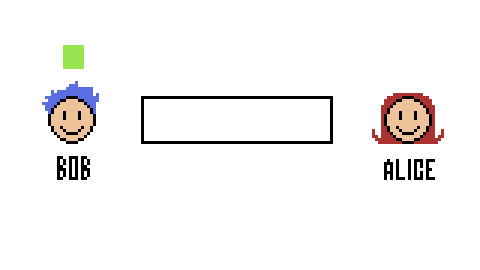Difference between revisions of "Channeling your inner capacity"
Ryan Antonio (talk | contribs) (Initial commit for topics to be covered) |
Ryan Antonio (talk | contribs) |
||
| Line 1: | Line 1: | ||
== Channel Basics== | == Channel Basics== | ||
| + | When Shannon developed his theory of information, it was in the context of improving communication. His goal was to determine if there was a way to maximize the transmission rates over some noisy channel. In this module, we will learn more about the channel and some formal terminologies that we will later in the succeeding modules. The GIF below recalls the story of Bob and Alice. Bob wants to send a message to Alice across some channel. Let's simplify the scenario. Let's say Bob just wants to send a love letter to Alice through some wireless (satellite based) channel. | ||
| + | [[File:Bob alice nodencode.gif|center]] | ||
| + | |||
| + | [[File:Simple channel.PNG|300px|thumb|right|Figure 1: Simplified communication model]] | ||
| + | |||
| + | Figure 2 shows a simplified model of their communication. Bob is the '''source'''. Sometimes we use the term '''sender''' or '''transmitter''' for the source. The medium where the message goes through is the '''channel''' (in this case the wireless channel). Alice is the '''receiver''' who probably gets the correct message at the other end of the channel. Let's take a look at each component formally. | ||
| + | |||
| + | |||
| + | === The source === | ||
==Binary Symmetric Channels== | ==Binary Symmetric Channels== | ||
Revision as of 16:43, 25 February 2022
Contents
Channel Basics
When Shannon developed his theory of information, it was in the context of improving communication. His goal was to determine if there was a way to maximize the transmission rates over some noisy channel. In this module, we will learn more about the channel and some formal terminologies that we will later in the succeeding modules. The GIF below recalls the story of Bob and Alice. Bob wants to send a message to Alice across some channel. Let's simplify the scenario. Let's say Bob just wants to send a love letter to Alice through some wireless (satellite based) channel.
Figure 2 shows a simplified model of their communication. Bob is the source. Sometimes we use the term sender or transmitter for the source. The medium where the message goes through is the channel (in this case the wireless channel). Alice is the receiver who probably gets the correct message at the other end of the channel. Let's take a look at each component formally.

